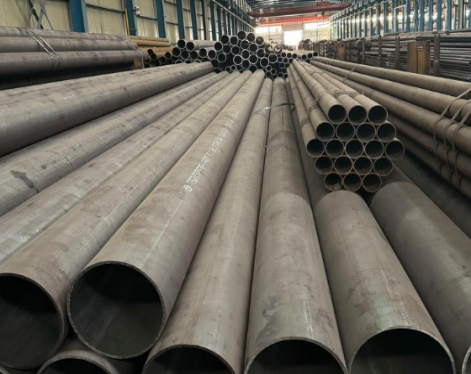Tensile strength of seamless pipes:
Tensile strength of seamless pipes refers to the maximum stress value that the material bears during the stretching process. The tensile strength of seamless pipes on the market is generally between 400 and 1000MPa, which covers a variety of seamless pipe products with manufacturing processes and materials. Tensile strength is one of the important indicators for measuring the quality of seamless pipes, and it is of great significance to ensure the safe application of products in high-strength occasions.

Factors affecting the tensile strength of seamless pipes:
1. Manufacturing process: The manufacturing process of seamless pipes has a significant impact on their tensile strength. Generally speaking, seamless pipes manufactured using cold drawing production processes have higher tensile strengths, which can reach 650~900MPa. The tensile strength of seamless pipes produced by hot rolling is relatively low, ranging from 300~600MPa.
2. Material: The material of seamless pipes is also an important factor affecting their tensile strength. The tensile strength of carbon steel seamless pipes usually ranges from 400 to 840 MPa, while alloy seamless pipes, especially high-strength alloy seamless pipes, can reach tensile strengths of more than 1000 MPa.
3. Wall thickness and pipe diameter: Wall thickness and pipe diameter also have a certain influence on the tensile strength of seamless pipes. Generally speaking, seamless pipes with thicker walls have relatively higher tensile strength, while seamless pipes with larger diameters have relatively lower tensile strength.
4. Heat treatment: Proper heat treatment can improve the tensile strength of seamless pipes. However, excessive heat treatment may cause the seamless pipe to harden, thereby reducing its plasticity.
Choose suitable seamless pipe products:
When purchasing seamless pipes, the above factors should be considered comprehensively according to the specific application fields and process requirements, and products with appropriate tensile strength should be selected. For example, in practical applications, the tensile strength of seamless steel pipes has an important influence on their use effect and safety. Seamless steel pipes with high tensile strength can better withstand external loads and are suitable for occasions requiring high-strength support, such as petroleum geological drilling, boiler manufacturing, automobile manufacturing and other fields.
In summary, the tensile strength of seamless pipes is affected by many factors, including manufacturing process, material, wall thickness, pipe diameter, and heat treatment. When selecting seamless pipes, it is necessary to select products with appropriate tensile strength according to specific application areas and process requirements.
Tensile strength of seamless pipes refers to the maximum stress value that the material bears during the stretching process. The tensile strength of seamless pipes on the market is generally between 400 and 1000MPa, which covers a variety of seamless pipe products with manufacturing processes and materials. Tensile strength is one of the important indicators for measuring the quality of seamless pipes, and it is of great significance to ensure the safe application of products in high-strength occasions.

Factors affecting the tensile strength of seamless pipes:
1. Manufacturing process: The manufacturing process of seamless pipes has a significant impact on their tensile strength. Generally speaking, seamless pipes manufactured using cold drawing production processes have higher tensile strengths, which can reach 650~900MPa. The tensile strength of seamless pipes produced by hot rolling is relatively low, ranging from 300~600MPa.
2. Material: The material of seamless pipes is also an important factor affecting their tensile strength. The tensile strength of carbon steel seamless pipes usually ranges from 400 to 840 MPa, while alloy seamless pipes, especially high-strength alloy seamless pipes, can reach tensile strengths of more than 1000 MPa.
3. Wall thickness and pipe diameter: Wall thickness and pipe diameter also have a certain influence on the tensile strength of seamless pipes. Generally speaking, seamless pipes with thicker walls have relatively higher tensile strength, while seamless pipes with larger diameters have relatively lower tensile strength.
4. Heat treatment: Proper heat treatment can improve the tensile strength of seamless pipes. However, excessive heat treatment may cause the seamless pipe to harden, thereby reducing its plasticity.
Choose suitable seamless pipe products:
When purchasing seamless pipes, the above factors should be considered comprehensively according to the specific application fields and process requirements, and products with appropriate tensile strength should be selected. For example, in practical applications, the tensile strength of seamless steel pipes has an important influence on their use effect and safety. Seamless steel pipes with high tensile strength can better withstand external loads and are suitable for occasions requiring high-strength support, such as petroleum geological drilling, boiler manufacturing, automobile manufacturing and other fields.
In summary, the tensile strength of seamless pipes is affected by many factors, including manufacturing process, material, wall thickness, pipe diameter, and heat treatment. When selecting seamless pipes, it is necessary to select products with appropriate tensile strength according to specific application areas and process requirements.









